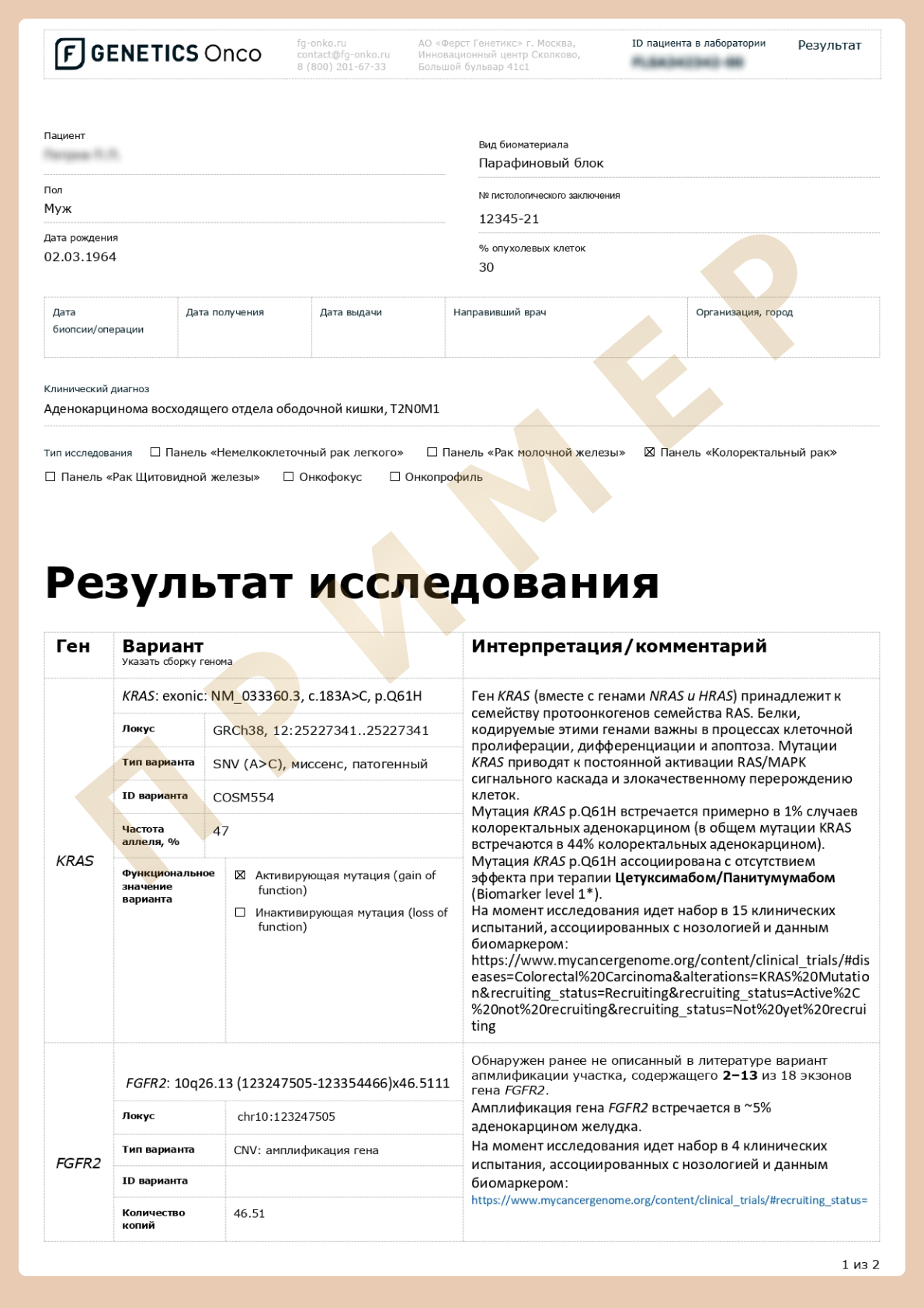
Genetic testing for colorectal cancer (CRC)
Colorectal cancer is widespread and often occurs as transformation within adenomatous polyps.
More than half of the cases occur in the rectum and sigmoid, and 95% are adenocarcinomas. Colon and rectal cancers are often grouped in one because they have a lot in common.
What is Genetic testing for colorectal cancer?
An NGS-based assay includes a panel of genes concurred with the clinical use of approved targeted drugs and drugs from prospective clinical trials for colorectal cancer.
Alterations in these genes lead to tumor development and are used as diagnostic, prognostic, and predictive cancer markers.
"First Genetics Lab" performs testing using the high‑throughput sequencing system named "F‑Genetics" and reagents for high‑throughput next generation sequencing (NGS) of genes associated with human cancer genesis, that are registered as medical devices (Federal Service for Surveillance in Healthcare: РЗН 2020/10521, РЗН 2022/16970)
The assay detects:
- Hotspots (SNV/InDels)
- Copy number variations (CNV)
- Chromosomal aberrations (Gene fusions)
Testing indications:
For patients diagnosed with colorectal cancer for:
- Therapy selection
- Therapy monitoring and correction if the cancer recurrence occurs
- Clinical trials enrollment
Targeted therapy
Targeted therapy is the type of treatment that targets specific molecules/proteins on the cancer cell surface or inside the cancer cells, blocking the growth and spread of cancer cells and limiting damage to healthy cells.
Not all tumors have the same targets. Genetic tests are used to find out what treatment is the most effective. Many clinical studies are underway.
Targeted therapy. Indications for drugs
PRINCIPLES OF MOLECULAR REVIEW (NCCN Guidelines Version 1.2022)
| KRAS, NRAS, and BRAF Mutation Testing | All patients with metastatic colorectal cancer should have their tumor genotyped for RAS (KRAS and NRAS) and BRAF mutations. KRAS or NRAS mutations (ex 2, 3, 4) should not be treated with either cetuximab or panitumumab. BRAF V600E mutation makes response to panitumumab or cetuximab highly unlikely unless given with a BRAF inhibitor Encorafenib + (cetuximab or panitumumab). BRAF V600E mut +MLH1 protein expression absence — preclude Lynch Syndrome in 99% of cases. |
| HER2 Testing | Anti-HER2 therapy (Trastuzumab + [pertuzumab or lapatinib] or fam-trastuzumab deruxtecan-nxki) is only indicated in HER2-amplified tumors that are also RAS and BRAF wild type. |
| NTRK Fusions | The overall incidence of NTRK fusions is approximately 0.35%. But the numbers may increase in KRAS, NRAS, BRAF negative, and MSI-H tumors. The rate of NTRK false-positive samples by IHC is 1 in 5. So, when IHC used it also should be confirmed by RNA NGS. NTRK inhibitors (Larotrectinib or entrectinib) have been shown to have activity ONLY in those cases with NTRK fusions and NOT with NTRK point mutations. |
| Microsatellite Instability (MSI) or Mismatch Repair (MMR) testing | is recommended in all newly diagnosed patients with colon cancer. [Nivolumab ± ipilimumab] or pembrolizumab are indicated only for dMMR/MSI-H. |
NGS method
NGS can simultaneously read hundreds of millions of short sequences of DNA and detect all types of mutations, including

Hotspots (SNV/InDels)

Copy number variations (CNV)

Chromosomal aberrations (Gene fusions)
Advantages
- High sensitivity and specificity of the method
- Fast turnaround time
- Simultaneous detection of all types of mutations, including chromosomal aberrations
- Minimum requirements for sample quantity and quality
- Shorter testing times
How to request the genetic testing for colorectal cancer?
Download and fill out the informed consent form
A courier will collect histological material and take it to the laboratory free of charge.
First Genetics Laboratory
Specialists
Years of experience in genetics, laboratory diagnostics and bioinformatics
Confidentiality
All data is strictly confidential and cannot be passed on to third parties
Time frame
Results ready in a short time
Security
Extensive control at each stage of testing
No delivery fees
Free delivery of biomaterial across Russia
Charities
Email info@f-genetics.com for information


